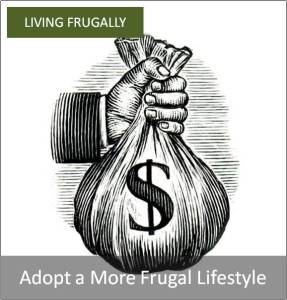 I would like to take you on a mental journey to a place of less … less consumption, less waste, less spending, less accumulation of stuff. In this place, less actually leads to more – I see your forehead wrinkling but stay with me. Less spending yields more saving and less consumption yields more contentment.
I would like to take you on a mental journey to a place of less … less consumption, less waste, less spending, less accumulation of stuff. In this place, less actually leads to more – I see your forehead wrinkling but stay with me. Less spending yields more saving and less consumption yields more contentment.
In our American culture, being frugal is sometimes synonymous with being a tightwad, penny pincher or cheapskate. We are all about the latest gadgets, the newest models, and the most expensive everything. But let’s think for a second. How is it that folks featured in the books The Millionaire Mind and The Millionaire Next Door are ordinary folks with ordinary jobs yet have bank accounts that most of us only dream about? The answer is frugality.
See, these self-made millionaires are frugal with their incomes. That is why they’re millionaires. They don’t spend money on the big boat, high-priced vehicles, fancy eateries, designer clothes, etc. On the contrary, they’re completely content with a used … sorry, certified pre-owned … American made car, no-name clothing and eating meals at home. They save the money most would spend on a yacht to pay for their child’s education instead – 100% cash, no financing. These folks frequent thrift shops. There they find both designer and non-designer clothing at half the price, or less. What does this mean in the long run? Simple: They keep a higher percentage of their paychecks than you do!
So with that in mind, let’s explore how you can put yourself on Frugalist Street. We’ll concentrate on how it will affect you, specifically thinking of, “How will being frugal help me retire financially free?”
Consider how much you spend on things you really don’t need. Let’s take that cable/satellite package you’ll be using to entertain your friends this season. At ninety dollars a month you are spending $1,080 a year on a ton of channels, knowing you won’t watch most of them. Now, take the number of years between your present age and age 65. For me that’s 27 years. When we multiply 27 by the annual cost of that cable package we get a whopping $29,160! Yeah I was also shocked when I did the math.
That’s how much money you could have in the bank at retirement age if you decided to live frugally by watching the games at a sports bar instead of paying for it at home. Keep in mind this number is before compound interest is calculated over that 27 year period. Imagine the places you could visit during retirement if you lived as a Frugalist now. Imagine being able to help someone in need or donate to charities if you were disciplined enough to spend less now.
My encouragement for now – for your sake and those of your loved ones – is to decide to live the Frugalist lifestyle. You will not regret it.